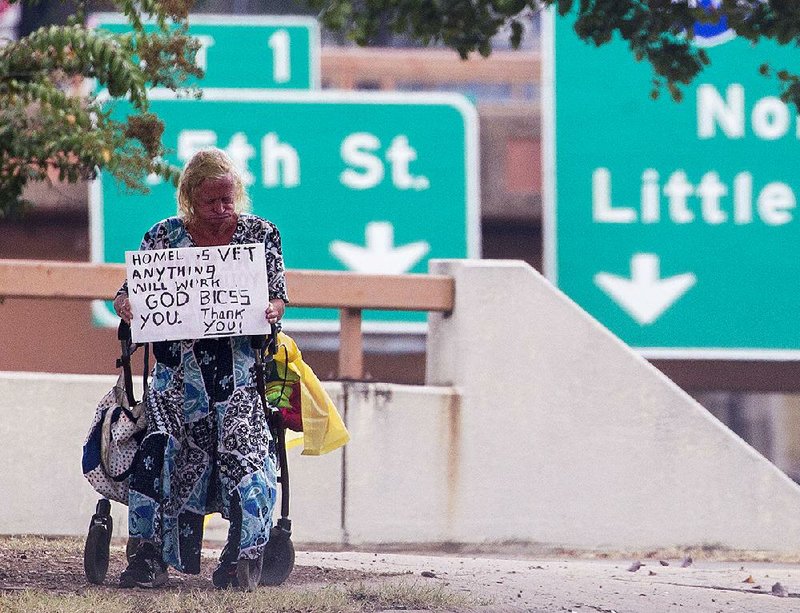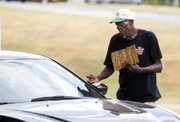A federal judge has blocked the state from enforcing a newly rewritten section of the state's anti-loitering law, saying that by prohibiting a certain type of speech -- begging -- the law is "plainly unconstitutional."
U.S. District Judge Billy Roy Wilson issued a preliminary injunction that keeps the state from enforcing Arkansas Annotated 5-71-213(a)(3) until a final order is entered in a lawsuit filed last month on behalf of two frequent panhandlers by the Arkansas chapter of the American Civil Liberties Union.
The lawsuit was the second one the ACLU filed on behalf of the two men, Michael Andrew Rodgers and Glenn Dilbeck, both 53.
The first lawsuit, filed a year ago, challenged an earlier version of the law and led to Wilson declaring it unconstitutional. State lawmakers then rewrote the section this year to expand the definition of the circumstances in which the law would apply, but the revised law still centered on the act of asking for charity.
Wilson's ruling, released late Tuesday afternoon, said that under the First Amendment to the United States Constitution, and the 14th Amendment that applied it to states, lawmakers may not "restrict expression because of its message, its ideas, its subject matter, or its content," without a compelling reason to do so.
Attorneys for the state argued in court documents and during a Sept. 5 hearing that they believed the "compelling reason" for the revised version of the law is the state's interest in public safety and motor vehicle safety. They said the new version of the law furthered that interest in the least intrusive means possible by specifying that the begging is only illegal if it is harassing, alarming or threatening or creates a traffic hazard or impediment.
Wilson said, "I have no doubt that holding a sign asking for gifts or charity could 'create a traffic hazard or impediment' ... and, to a lesser degree of certainty, that it is possible that holding a sign asking for gifts or charity might cause others to feel threatened, harassed, or alarmed."
But, he said, "Section 5-71-213(a)(3) restricts only a certain species of speech (asking for gifts or charity.) Thus, if two people created a traffic hazard or impediment by holding signs, but one asks passers-by to vote for a political candidate and the other asks passers-by to give to a charity, Section 5-71-213(a)(3) would apply only to the person whose signs asks passers-by to give to a charity. Accordingly, (the section) is a content-based restriction of constitutionally protected speech."
Wilson also wrote that "nothing in the record, nor common sense, suggests that a wide variety of other speech (e.g., wearing a Statue of Liberty costume while waving to oncoming traffic and soliciting tax-return customers, encouraging folks to get right with the Lord, or stumping for a political candidate) would be less likely than begging to cause a traffic hazard or impediment."
The judge emphasized that there are other laws on the books that address the conduct identified in 5-71-213(a)(3). He named as examples laws against criminal trespass; harassment; assault; stopping, standing or parking in certain places; highway solicitation; coercion; disorderly conduct; obstructing a highway or other public passage; soliciting rides in certain places; and impeding the flow of traffic.
A spokesman for Attorney General Leslie Rutledge, whose office defended the rewritten law, said Wednesday in an email, when asked about Wilson's injunction, "The Attorney General respectfully disagrees with the District Court's decision and is considering her options."
The spokesman, Judd Deere, wouldn't say whether the attorney general might appeal the preliminary ruling to the 8th U.S. Circuit Court of Appeals or perhaps work with legislators to rewrite the section again.
The ACLU applauded the ruling. Rita Sklar, executive director of the Arkansas chapter, called it "a victory for all Arkansans who value their First Amendment rights."
She added, "Being poor is not a crime, and asking for help shouldn't land you in jail. The ACLU of Arkansas will continue to defend the fundamental freedoms guaranteed by the Bill of Rights, especially on behalf of vulnerable people to whom its protections are too often denied."
Unlike his ruling last year concerning the previous version of the state's anti-loitering law, Wilson's latest injunction is preliminary, not permanent, and will be considered in more detail after both sides conduct discovery and present more evidence at a trial.
On Nov. 22, Wilson struck down the previous section, which had been in place for more than 30 years but hadn't previously been challenged. It made it illegal for a person to "linger or remain in a public place or on the premises of another for the purpose of begging." It didn't include the requirements that the behavior be harassing, alarming, threatening or hazardous or an impediment to traffic.
Wilson's order cited a Little Rock police officer's testimony at the Sept. 5 hearing. Officer Robert Hinman testified about his encounter, before the revised law took effect, with an "aggressive" panhandler who got increasingly close to a bystander, making the bystander feel unsafe and causing him to finally duck into a business to escape.
"Officer Hinman had at his disposal a whole arsenal of existing laws that addressed the actions of the aggressive panhandler," Wilson said, citing harassment, disorderly conduct, coercion, third-degree assault and third-degree stalking laws.
"Officer Hinman testified that he did not believe the panhandler's actions fell within the scope of these laws because the panhandler's purpose was to get money," Wilson said. But, he added, "Whenever this panhandler's attempts to get money became harassive, coercive, threatening, several other statutes stood ready. ... Officer Hinman's decision not to deploy these statutes does not create a compelling need."
Addressing an argument by the state that the plaintiffs faced only minimal harm as a result of the law because they could still beg in other places, Wilson said "this type of theory ... suggests that criminalizing protected speech is an insignificant violation of the Constitution. Criminalizing protected speech is never insignificant."
Wilson rejected an argument that he allow the Arkansas Supreme Court an opportunity to narrow the law to ensure its constitutionality. He said the law "is not readily subject to a narrowing construction," and "it's not a court's function to rewrite statutes to make them constitutional -- nor do Arkansas courts have a habit of doing so."
He also rejected the state's contention that the plaintiffs didn't have standing to sue because, among other things, they had never been cited by the new law.
Wilson noted that Dilbeck testified that he moved to Tennessee to avoid being cited under the new law, and that Rodgers testified that he continues to beg, but hides his sign from police and avoids certain areas to avoid being cited.
"This chilling effect is the actual injury that gives Plaintiffs standing," Wilson said.
Metro on 09/28/2017

